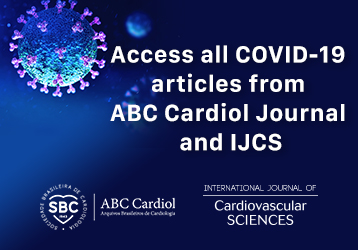Volume 110, Nº 1, January 2018
DOI: http://www.dx.doi.org/10.5935/abc.20170177
ORIGINAL ARTICLE
Association of Multiple Genetic Variants with the Extension and Severity of Coronary Artery Disease
Simone Cristina Pinto Matheus Fischer
Simone Pires Pinto
Lívia Campos do Amaral Silva Lins
Henrique Tria Bianco
Carlos Manoel de Castro Monteiro
Luiz Fernando Muniz Pinheiro
Francisco Antonio Helfenstein Fonseca
Maria Cristina de Oliveira Izar

Abstract
Background: Metabolic syndrome (MS) is a condition that, when associated with ischemic heart disease and cardiovascular events, can be influenced by genetic variants and determine more severe coronary atherosclerosis.
Objectives: To examine the contribution of genetic polymorphisms to the extension and severity of coronary disease in subjects with MS and recent acute coronary syndrome (ACS).
Methods: Patients (n = 116, 68% males) aged 56 (9) years, with criteria for MS, were prospectively enrolled to the study during the hospitalization period after an ACS. Clinical and laboratory parameters, high-sensitivity C-reactive protein, thiobarbituric acid reactive substances, adiponectin, endothelial function, and the Gensini score were assessed. Polymorphisms of paraoxonase-1 (PON-1), methylenotetrahydrofolate reductase (MTHFR), endothelial nitric oxide synthase (ENOS), angiotensin-converting enzyme (ACE), angiotensin II type 1 receptor (AT1R), apolipoprotein C3 (APOC3), lipoprotein lipase (LPL) were analysed by polymerase chain reaction (PCR) technique, followed by the identification of restriction fragment length polymorphisms (RFLP, and a genetic score was calculated. Parametric and non-parametric tests were used, as appropriate. Significance was set at p < 0.05.
Results: Polymorphisms of PON-1, MTHFR and ENOS were not in the Hardy-Weinberg equilibrium. The DD genotype of LPL was associated with higher severity and greater extension of coronary lesions. Genetic score tended to be higher in patients with Gensini score < P50 (13.7 ± 1.5 vs. 13.0 ± 1.6, p = 0.066), with an inverse correlation between genetic and Gensini scores (R = –0.194, p = 0.078).
Conclusions: The LPL polymorphism contributed to the severity of coronary disease in patients with MS and recent ACS. Combined polymorphisms were associated with the extension of coronary disease, and the lower the genetic score the more severe the disease. (Arq Bras Cardiol. 2018; 110(1):16-23)
Keywords: Coronary Artery Disease / genetic; Polymorphism, Genetic; Metabolic Syndrome; Sedentary Lifestyle.















